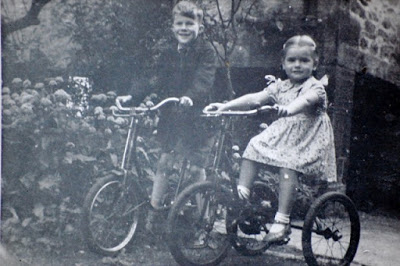Ionesco, Lewis Carroll, Sir Arthur Conan Doyle
Eugène Ionesco, La Cantatrice chauve
Eugène Ionesco (born Eugen Ionescu, Romanian: 26 November 1909 – 28 March 1994) was a Romanian-French playwright who wrote mostly in French, and one of the foremost figures of the French Avant-garde theatre [well, the theater of the abusrd]. Beyond ridiculing the most banal situations, Ionesco’s plays depict the solitude and insignificance of human existence in a tangible way.
[la cantatrice sings operatic songs or national anthems whereas une chanteuse sings pop songs. Edith Piaff was a chanteuse. That explains the translation “soprano’]
Mr. MARTIN : Depuis que je suis arrivé à Londres, j’habite rue Bromfleld, chère Madame.
Mme MARTIN : Comme c’est curieux, comme c’est bizarre ! moi aussi, depuis mon arrivée à Londres j’habite rue Bromfleld, cher Monsieur.
Mr. MARTIN : Comme c’est curieux, mais alors, mais alors, nous nous sommes peut-être rencontrés rue Bromfleld, chère Madame.
Mme MARTIN : Comme c’est curieux ; comme c’est bizarre ! c’est bien possible, après tout ! Mais je ne m’en souviens pas, cher Monsieur.
Mr. MARTIN : Je demeure au N° 19, chère Madame.
Mme MARTIN : Comme c’est curieux, moi aussi j’habite au N° 19, cher Monsieur.
Mr. MARTIN : Mais alors, mais alors, mais alors, mais alors, mais alors, nous nous sommes peut-être vus dans cette maison, chère Madame !
Mme MARTIN : C’est bien possible, mais je ne m’en souviens pas, cher Monsieur.
Mr. MARTIN : Mon appartement est au cinquième étage, c’est le numéro 8, chère Madame.
Mme MARTIN Comme c’est curieux, mon Dieu, comme c’est bizarre ! et quelle coïncidence ! moi aussi j’habite au cinquième étage, dans l’appartement numéro 8, cher Monsieur !
Mr. MARTIN ( songeur ) : Comme c’est curieux, comme c’est curieux, comme c’est curieux et quelle coïncidence! vous savez, dans ma chambre à coucher j’ai un lit. Mon lit est couvert d’un édredon vert. Cette chambre, avec ce lit et son édredon vert, se trouve au fond du corridor, entre les water et la bibliothèque, chère madame !
Mme MARTIN : Quelle coïncidence, ah mon Dieu, quelle coïncidence ! Ma chambre à coucher a, elle aussi, un lit avec un édredon vert et se trouve au fond du corridor, entre les water, cher Monsieur, et la bibliothèque !
Mr. MARTIN : Comme c’est bizarre, curieux, étrange ! alors. Madame, nous habitons dans la même chambre et si nous dormons dans le même lit, chère Madame. C’est peut-être là que nous nous sommes rencontrés.
Mme MARTIN : Comme c’est curieux et quelle coïncidence! C’est bien possible que nous nous y soyons rencontrés, et peut-être même la nuit dernière. Mais je ne m’en souviens pas, cher Monsieur !
Mr. MARTIN : J’ai une petite fille, ma petite fille, elle habite avec moi, chère Madame. Elle a deux ans, elle est blonde, elle a un œil blanc et un œil rouge, elle est très jolie, elle s’appelle Alice, chère Madame.
Mme MARTIN : Quelle bizarre coïncidence ! moi aussi j’ai une petite fille, elle a deux ans, un œil blanc et un œil rouge, elle est très jolie et s’appelle aussi Alice, cher Monsieur !
Mr. MARTIN : ( Même voix traînante, monotone ). Comme c’est curieux et quelle coïncidence ! et bizarre ! c’est peut-être la même, chère Madame !
Lewis Carroll
CHAPTER II (Alice in Wonderland and Through the Looking Glass by Lewis Carroll “Alice in Wonderland” redirects here. For other uses, see Alice in Wonderland (disambiguation). Alice’s Adventures in Wonderland is a novel by Lewis Carroll (Charles Lutwidge Dodgson), published on 4 July 1865
The Pool of Tears
‘Curiouser and curiouser!’ cried Alice (she was so much surprised, that for the moment she quite forgot how to speak good English); ‘now I’m opening out like the largest telescope that ever was! Good-bye, feet!’ (for when she looked down at her feet, they seemed to be almost out of sight, they were getting so far off). ‘Oh, my poor little feet, I wonder who will put on your shoes and stockings for you now, dears? I’m sure I shan’t be able! I shall be a great deal too far off to trouble myself about you: you must manage the best way you can; –but I must be kind to them,’ thought Alice, `or perhaps they won’t walk the way I want to go! Let me see: I’ll give them a new pair of boots every Christmas.’
Alice stretched tall.
Sir Arthur Conan Doyle
The curious Sherlock Holmes and the curious Dr. Watson, both found many curious clues in their murder investigations. Agatha Christie also found curious clues, curious inconsistencies that led her to discover the identity of a victim’s true killer. It is the favorite adjective of the British murder mystery genre and tradition.
© 11 December 2017
About the Author
I was born in 1944, I lived most of my life in New York City, Queens County. I still commute there. I worked for many years as a Caseworker for New York City Human Resources Administration, dealing with mentally impaired clients, then as a social work Supervisor dealing with homeless PWA’s. I have an apartment in Wheat Ridge, CO. I retired in 2002. I have a few interesting stories to tell. My boyfriend Kevin lives in New York City. I graduated Queens College, CUNY, in 1967.



